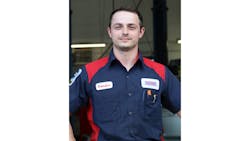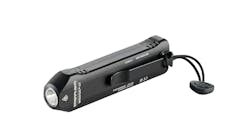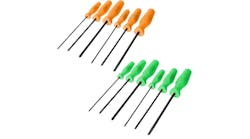Motor Age and PTEN are committed to supporting young technicians in the automotive aftermarket and we want to shine a spotlight on those who are paving a successful path in the industry. This is part of a monthly series to showcase the best young talent in our industry.
“[Brandon] is what one would describe as the ideal team player,” says Kandie Jennings-Molloy, owner of Tom’s Automotive Service in Seattle, “He exemplifies what every shop hopes to have in a technician.”
This high praise is not unfounded. Brandon Laguire started his career at Tom’s Automotive Service as a lube technician and 10 years later, he is an ASE Certified Master Technician, is emissions certified, and holds the title of lead technician.
This young technician made it into the top ten candidates for the second annual PTEN and Motor Age Best Young Tech Award, a program that aims to recognize innovation, dedication, and excellence in the industry’s technicians aged 35 and younger.
Jennings-Molloy notes that Laguire was the “driving force” behind some major shop improvements. Most notably the shop’s transition to a digital inspection platform, which enabled the shop to provide more professional inspections for their clients, as well as streamline their inspection process and ultimately make the shop more profitable.
On top of his hard work and dedication in the shop, Laguire is an active member of their community. Not only is he on his church’s softball team, on a hockey team, and in a pool league – he also donates his free time to repair vehicles for those who rely on them but cannot afford to have them fixed.
Laguire is “someone younger generations can look up to. He is a great mentor…and encourages young people to be part of our industry,” Jennings-Molloy says.
He sat down with PTEN and Motor Age magazines to talk about his career path, offer guidance to other young techs, and share some anecdotes.
What are your career aspirations?
My career aspirations – I feel like I kind of made it. My goal is to be a lead tech, and I've recently achieved that, but going forward I want to continue learning and expand my knowledge about automotive systems and repairs and just keep improving.
What is your favorite tool and why?
My favorite tool would be – I have a 3/8” drive electric ratchet. A Snap-on one. I use that thing constantly. It's small and lightweight and you can zap bolts off and back on. I just remember when I first started, I didn't have any electric tools, and I was ratcheting out every single bolt and how much time that took. I look back and I'm like, ‘I can't believe I was doing that. It was just insane.’
Even something as simple as an under-engine cover or something. There are sometimes like 10 screws or bolts and it’s just crazy to think that took me 5-10 minutes to take it off, and it's like a one-minute job with the little electric gun.
I'd say other than that maybe my flashlight. My flashlight and pocket screwdriver are my most used tools day-to-day, but it's hard to pick a favorite.
How did you first become interested in the automotive industry?
Growing up, I had a lot of friends who were into cars and into racing cars and stuff like that, so that's kind of how I got interested in them.
We did Hondas and Accuras back when I was in high school, and I bought a Honda and started fixing it up and found myself helping my friends fix their cars up. That's really where I got my interest in the automotive field, and I guess I didn't really have much money, so I wasn't going to pay someone to fix my car, so I had to try to figure it out myself.
If you weren’t in the automotive industry what would you be doing?
If I wasn't in the automotive industry I always thought it would be really cool to be an electrician. I have always been fascinated with electricity, and I just think it's so cool, especially solenoids and stuff like that like electrical components where it's using electricity to move something mechanically. I just think that's really awesome.
I kind of considered that after high school – being an electrician. ln the program I wanted to do, there was like a three-year weight list or something crazy, so I was like, ‘I'll try automotive and see how I like it.’ And automotive has been a really good career. It's very, very challenging though. You have to really put a lot of work in.
I know when I first started, I thought I was super smart because I went to tech school and then I came into the field and I was like, ‘Oh, shit. I don't know what I'm doing.’ And still to this day, there are a lot of cars coming in with some type of system that I may not be familiar with, and I have to do my research and learn more to figure it out.
What was your first job in the auto industry?
Okay my first automotive job was for a rental fleet called Avis Rental Car, and I actually got that job while I was still in tech school. I had I think six months left, and there were two other guys in my program that had already been working at the Avis Rental Car doing tire repair and oil changes and stuff like that, like entry-level. And they were hiring, so they told me to put in an application, and that's how I got my first automotive job.
What is the most challenging or memorable repair that you’ve ever worked on?
One, that I really struggled with it was I did a clutch on a Ford Ranger and it's gotta be one of the easiest clutches ever. It's a real drive. There's not much in the way and the transmission pops right out, and it seemed like the job went really smoothly. I also put a slave cylinder in there, because on those the slave cylinders are inside of the bill housing and the customer kept coming back saying that their clutch peddle was low. It would feel spongy or soft. I was like, ‘Well, that's kind of weird,’ so we put a clutch master cylinder in thinking that maybe there's air getting in or bypassing internally.
Then the car came back again, and I was like, ‘I don't know. I really bleed the system out and there's no air in there,’ and I was doubting myself. I thought, ‘Maybe there's something wrong with the clutch,’ so we put a whole new clutch in. We redid the initial job, and the car came back, and I couldn't figure it out.
Finally, I talked to someone through Identifix, and they told me that the slave cylinders – because we bought all OEM parts – the slave cylinders developed by Ford, they put too much grease on them when they assembled them, and the grease would get into the brake fluid and it would mix, and I'm not sure exactly what would happen. If that would cause air to slip past the seal and get into the system, but he's like, ‘Yeah, you just have to keep bleeding it,’ so I just kept bleeding it.
They came by once a week or something, and sure enough, I saw grease just shooting out of the bleeder and I think we did it three times. I think they came by once a week for three weeks and then finally the clutch pedal was really great, and we didn't have any problems.
How do you stay up-to-date on what’s new in the industry?
Motor Age -- you guys do like a lot of training that I follow. I do a lot of like studying at home, and I follow Pete Meier’s The Trainer on YouTube. I follow a lot of his stuff because I feel like the modern-day technician, at least in the aftermarket, we do a lot of like training, and what I personally have found myself doing is I watch a lot of YouTube. I watch Pete’s channel and the South Main Auto channel and ScannerDanner and Super Mario Diagnostics. I feel like to improve our game in our industry we have to utilize all these resources, so I just find myself watching a lot of YouTube and reading books. I have Paul Danner’s book. I'm just doing a lot of studying, almost every day, just to keep up with everything that's going on in the industry.



